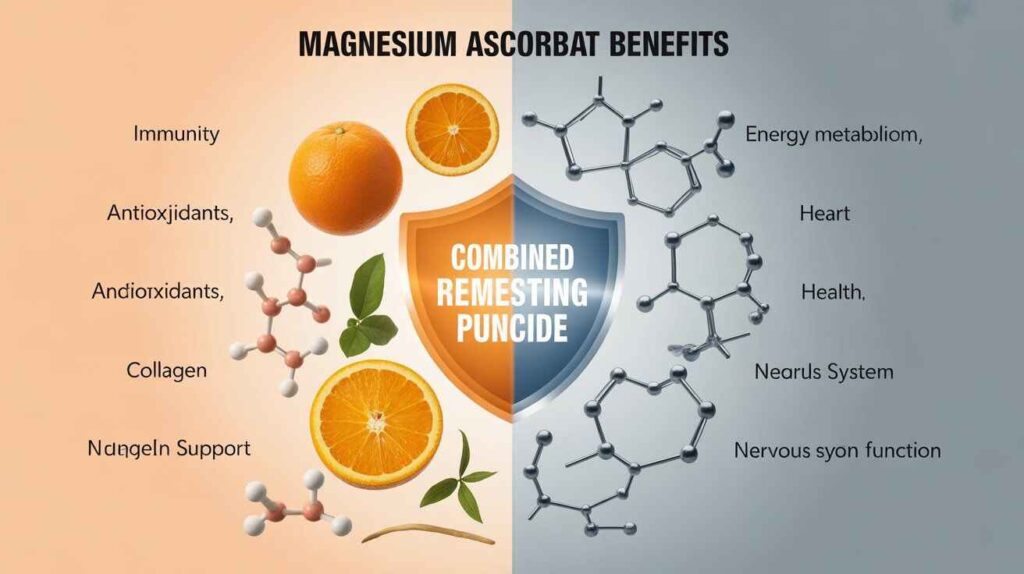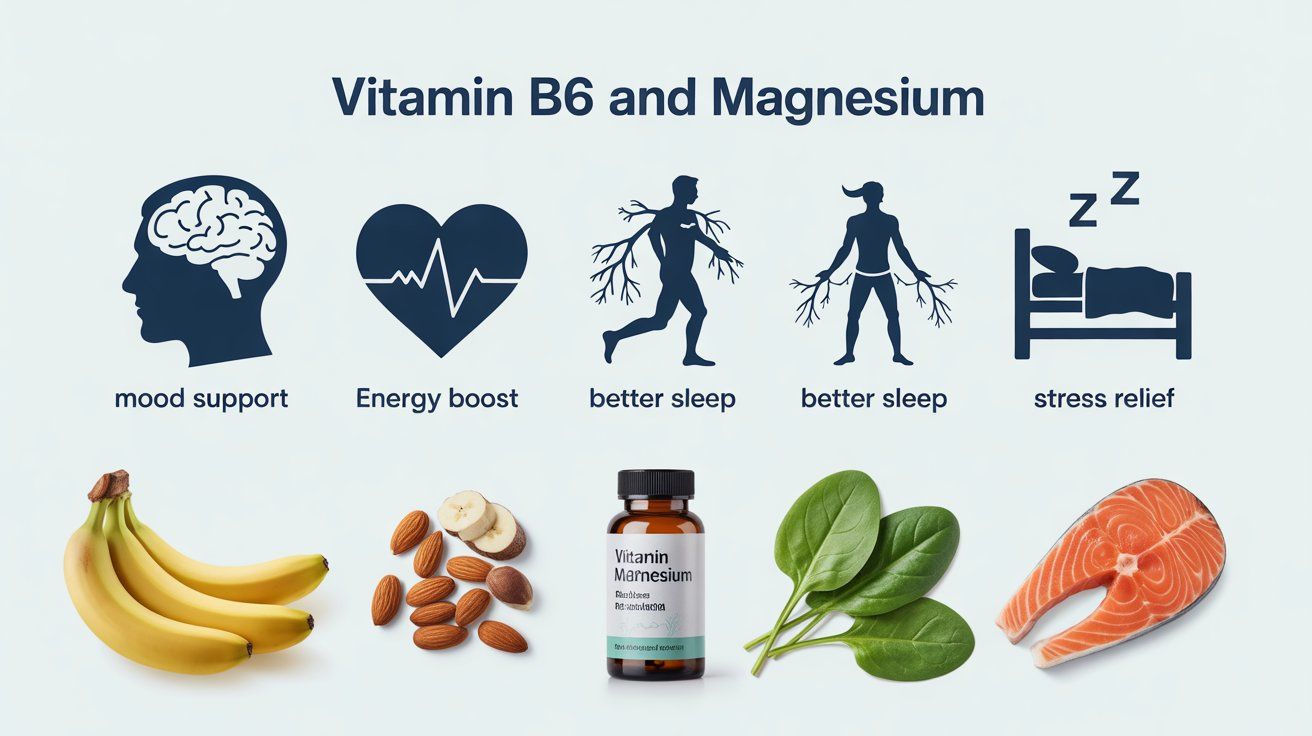Magnesium Ascorbate is a gentle, buffered vitamin C + magnesium combo that supports digestion, immunity, collagen, energy, and muscle health.
What Is Magnesium Ascorbate?
Magnesium ascorbate is a buffered vitamin C bound with magnesium.
This combination creates a non-acidic form of vitamin C that’s gentle on the stomach.
Beyond improving absorption, it provides the dual benefits of antioxidant support and essential mineral intake—two areas consistently highlighted in magnesium ascorbate benefits backed by science.

Gentle, Buffered Vitamin C for Digestive Comfort
One of the most recognized advantages of magnesium ascorbate is its role as a non-acidic vitamin C.
Traditional ascorbic acid can sometimes irritate the digestive tract, especially in higher doses.
Magnesium ascorbate, however, is a buffered vitamin C that is much gentler on the stomach, making it suitable for people with sensitive digestion.
Because it delivers both vitamin C and magnesium in one form, it reduces the likelihood of gastric upset while still offering strong antioxidant and immune benefits.
This makes it a practical choice for those seeking reliable magnesium ascorbate benefits backed by science.
Antioxidant Power & Immune Support
| Aspect | Details |
|---|---|
| Key Compound | Magnesium Ascorbate |
| Dual Advantage | Combines Vitamin C (antioxidant) + Magnesium (essential mineral) |
| Antioxidant Role (Vitamin C) | Protects cells from oxidative stress, reduces free radical damage, slows aging, and strengthens immunity |
| Magnesium Role | Supports immune cell activity, regulates inflammation, promotes cellular balance |
| Synergy | Works on multiple levels to reinforce natural defenses and maintain cellular health |
| Why Choose Magnesium Ascorbate | Gentle, effective, scientifically backed; offers nutrient synergy superior to standard vitamin C |
Collagen Production, Skin Health & Tissue Repair
Collagen is a structural protein that keeps skin firm, supports joint health, and aids in wound recovery.
Vitamin C is essential for collagen synthesis, and magnesium ascorbate provides this in a gentle, buffered vitamin C form that’s easier to tolerate.
Regular intake may help maintain skin elasticity, promote faster tissue repair, and reduce signs of aging by supporting natural collagen formation.
Magnesium further contributes by assisting enzymatic reactions involved in protein metabolism and cellular repair.
These combined actions explain why magnesium ascorbate benefits backed by science include stronger skin, healthier connective tissues, and improved overall resilience.
Safety, Dosage & Possible Side Effects
| Aspect | Details |
|---|---|
| General Safety | Well tolerated compared to acidic vitamin C forms. |
| Recommended Dosage | – Vitamin C: 500–1,000 mg daily – Magnesium: Up to 350 mg daily (supplemental) |
| Possible Side Effects | – Loose stools – Mild cramping – Digestive upset if exceeded |
| Special Precautions | People with kidney concerns should use caution, as excess magnesium may accumulate. |
| Health Benefits | Supports immunity, energy, and skin health when taken responsibly. |
| Professional Guidance | Consulting a healthcare professional ensures safe and effective use. |
Energy, Metabolism & Muscle Function from Magnesium Ascorbate
Magnesium is a vital mineral for more than 300 enzymatic reactions, many of which govern energy metabolism.
By supporting ATP production, it helps convert food into usable energy, reducing fatigue and promoting endurance.
When paired with vitamin C, which combats oxidative stress and contributes to reduced tiredness, the result is a nutrient combination that sustains both physical and mental performance.
Magnesium also plays a central role in muscle function and nerve signaling, further broadening its impact.
This synergy is one reason why magnesium ascorbate benefits backed by science are valued for energy support, recovery, and overall metabolic health.
Magnesium Ascorbate Benefits Backed by Science – Research Highlights
While direct clinical studies on magnesium ascorbate are limited, research on its individual components—magnesium and vitamin C—is extensive.
Vitamin C has been widely documented for its role in immunity, antioxidant defense, and collagen formation.
Magnesium has strong evidence supporting its importance in energy metabolism, heart health, and nervous system function.
When combined, they deliver complementary effects that address multiple biological pathways.
Emerging interest in mineral ascorbates highlights their improved tolerance compared to pure ascorbic acid.
Together, these findings explain why health professionals increasingly view magnesium ascorbate benefits backed by science as both practical and scientifically grounded.

Magnesium Ascorbate vs. Other Forms
Magnesium ascorbate belongs to the family of mineral ascorbates, which also includes calcium ascorbate and sodium ascorbate.
All provide buffered, non-acidic vitamin C, but magnesium ascorbate adds the unique benefit of supplying magnesium.
Compared to standard ascorbic acid, it is easier on the digestive system and less likely to cause irritation. Unlike magnesium oxide or citrate, it offers both mineral and antioxidant support in one compound.
This dual function makes it stand out among supplements, especially for people seeking broader benefits. Such comparisons reinforce the unique magnesium ascorbate benefits backed by science in everyday health and wellness.
FAQs – Magnesium Ascorbate Benefits Backed by Science
Q1. Is magnesium ascorbate better than regular vitamin C?
Yes. It’s a non-acidic vitamin C form, meaning it’s gentler on digestion. Unlike plain ascorbic acid, it also provides magnesium, which supports energy metabolism and muscle health. This makes it a more balanced option, combining two essential nutrients in one supplement.
Q2. Does magnesium ascorbate help with fatigue?
Yes, it supports energy metabolism and reduces tiredness.
Q3. Can magnesium ascorbate improve skin health?
Yes, it boosts collagen, aiding skin elasticity and repair.
Q4. What is the best dosage of magnesium ascorbate?
Typically 500–1000 mg daily, individualized by need.
Q5. Are there side effects of magnesium ascorbate?
Mild digestive upset may occur in excess.

Hamid Raza, aged 65, is a seasoned expert in nutrition, health supplements, and wellness, with over four decades of experience researching and educating people about essential minerals like magnesium. His work focuses on helping individuals improve energy, bone health, muscle function, and overall wellness through scientifically-backed magnesium knowledge.
Throughout his career, Hamid has contributed to numerous health articles, research studies, and wellness blogs, making complex nutritional science accessible to everyday readers. Passionate about natural health solutions, he guides readers on choosing the right magnesium supplements for optimal health.





